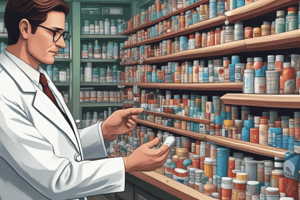Podcast
Questions and Answers
Grapefruit juice can heighten the likelihood of experiencing side effects from statins like atorvastatin.
Grapefruit juice can heighten the likelihood of experiencing side effects from statins like atorvastatin.
True (A)
The combination of antiplatelet drugs and NSAIDs decreases the risk of bleeding.
The combination of antiplatelet drugs and NSAIDs decreases the risk of bleeding.
False (B)
Multivalent ions such as calcium and magnesium can diminish the efficacy of drugs like levothyroxine.
Multivalent ions such as calcium and magnesium can diminish the efficacy of drugs like levothyroxine.
True (A)
Combining nitrates with PDE5 inhibitors can cause severe hypotension.
Combining nitrates with PDE5 inhibitors can cause severe hypotension.
ACE inhibitors such as ramipril are safe to use with potassium-elevating drugs.
ACE inhibitors such as ramipril are safe to use with potassium-elevating drugs.
Ritonavir does not affect the metabolism of protease inhibitors.
Ritonavir does not affect the metabolism of protease inhibitors.
Combining beta-blockers with calcium channel blockers can increase the risk of heart failure.
Combining beta-blockers with calcium channel blockers can increase the risk of heart failure.
Broad-spectrum antibiotics can lead to increased levels of vitamin K in the body.
Broad-spectrum antibiotics can lead to increased levels of vitamin K in the body.
Flashcards
Statins and Grapefruit Juice
Statins and Grapefruit Juice
Grapefruit juice interferes with statin metabolism, increasing side effects like muscle pain.
Antiplatelet/NSAID/Anticoagulant Combo
Antiplatelet/NSAID/Anticoagulant Combo
Combining these drugs significantly increases the risk of bleeding.
Multivalent Ions and Medications
Multivalent Ions and Medications
Substances like milk and antacids can reduce the effectiveness of certain drugs like levothyroxine.
Nitrates and PDE5 Inhibitors
Nitrates and PDE5 Inhibitors
Signup and view all the flashcards
ACE Inhibitors and Potassium
ACE Inhibitors and Potassium
Signup and view all the flashcards
Ritonavir and Protease Inhibitors
Ritonavir and Protease Inhibitors
Signup and view all the flashcards
Beta-Blockers and Calcium Channel Blockers
Beta-Blockers and Calcium Channel Blockers
Signup and view all the flashcards
Broad-Spectrum Antibiotics and Warfarin
Broad-Spectrum Antibiotics and Warfarin
Signup and view all the flashcards
Study Notes
Drug Interactions for PTCB Exam
-
Statins and Grapefruit Juice: Grapefruit juice contains furanocoumarins that interact with enzymes metabolizing statins (atorvastatin, simvastatin, lovastatin). This increases the risk of muscle pain/aches.
-
Antiplatelet, NSAIDs, and Anticoagulants: Combined use of antiplatelet drugs (clopidogrel), NSAIDs (aspirin, ibuprofen), and anticoagulants (warfarin, heparin) significantly increases bleeding risk. Also, SSRIs further amplify this risk.
-
Multivalent Ions and Various Drugs: Milk, antacids, calcium, magnesium, and iron can interact with medications like levothyroxine, tetracyclines, fluoroquinolones, and bisphosphonates, reducing their effectiveness.
-
Nitrates and PDE5 Inhibitors: Combining nitrates (e.g. nitroglycerin) and PDE5 inhibitors (sildenafil, tadalafil) can cause severe hypotension.
-
ACE Inhibitors and Potassium-Elevating Drugs: ACE inhibitors (ramipril, lisinopril) can elevate potassium levels. Avoid combining with potassium-elevating drugs (trimethoprim, potassium supplements) to prevent hyperkalemia.
-
Ritonavir and Protease Inhibitors: Ritonavir inhibits CYP enzymes, thus allowing lower doses of protease inhibitors (lopinavir) to achieve similar effects with fewer side effects.
-
Beta-Blockers and Calcium Channel Blockers: Combining beta-blockers (metoprolol) and calcium channel blockers (verapamil, diltiazem) increases the risk of heart failure and bradycardia.
-
Broad-Spectrum Antibiotics and Warfarin: Broad-spectrum antibiotics (penicillin, cephalosporins) deplete gut flora, reducing vitamin K production, increasing bleeding risk when taken with warfarin.
-
Digoxin and Loop/Thiazide Diuretics: Loop diuretics (furosemide) and thiazide diuretics (hydrochlorothiazide) can induce low potassium levels, increasing the risk of digoxin toxicity.
-
Aminoglycosides and Loop Diuretics: Combining aminoglycosides (gentamicin, amikacin) and loop diuretics (furosemide) increases the risk of ototoxicity and kidney damage.
Studying That Suits You
Use AI to generate personalized quizzes and flashcards to suit your learning preferences.




